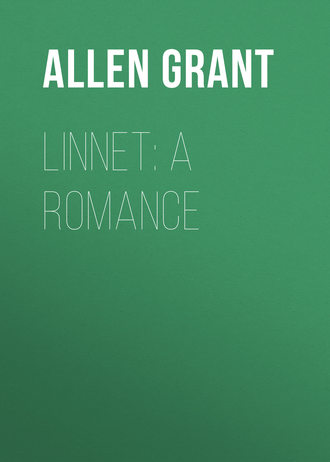 полная версия
полная версияLinnet: A Romance
Linnet’s nostrils quivered. She steadied herself with her hand on the table once more, and made answer boldly, “I think I could more easily face a roomful of people I’d never seen than sing before two in the parlour of the inn here; that seems less personal. But,” she added shyly, with half an appealing glance towards Will, “I’m not so nervous now. If this gentleman wishes, I – I would sing another song to him?”
And so she did – a second and a third. As she went on, she grew braver, and sang each time more naturally. At last the wirth dismissed her. Linnet curtsied, and disappeared. “Well, what do you say to her now?” the landlord asked in a tone of triumph, turning round to the young men as the door closed behind her.
Florian assumed his most studiously judicial air. The perfect critic should, above all things, be critical. Before Linnet’s face, indeed, he had been enthusiastic enough, as politeness and due respect for her sex demanded; but behind her back, and in her teacher’s presence, regard for his reputation compelled him to adopt the severest tone of incorruptible impartiality. “I think,” he said slowly, fingering his chin in one hand, and speaking with great deliberation, like a recognised authority, “with time and training she ought to serve your purpose well for popular entertainments. Her organ, though undeveloped, is not wholly without some natural power and compass.”
“And I think,” Will Deverill added, with a glow of generous enthusiasm, “you’ve lighted on one of the very finest voices in all Europe.”
CHAPTER VI
THE ROBBLER
A day or two passed, and the young men from time to time saw, by glimpses and snatches, a good deal of Linnet. For now the summer season on the hills was over, and the cows had come back to their stall-fed existence, the musical alp-girl had leisure on her hands for household duties. In the morning she helped in the general work of the inn; in the afternoon she practised much in the parlour upstairs with Andreas Hausberger and his little company. But in the evenings, – ah, then, the landlord brought her in more than once, by special request, to sing her native songs to Will Deverill’s accompaniment on the lame old fiddle from the corner cupboard. Those were pleasant meetings enough. Gradually the mountain lass grew less afraid of the strangers; she talked German more freely with Will Deverill now, and considerably enlarged her English vocabulary by listening to Florian’s richly-worded harangues on men, women, and things, and the musical glasses. It surprised Florian not a little, however, to see that this child of Nature, unlike the ladies of culture in London drawing-rooms, positively preferred Will’s society to his own, if such a fact seems credible; though he explained away in part this unaccountable defect of taste and instinct in one female heart by the reflection that, after all, Will was able to converse with her in her own language. His own finer points she could hardly understand; his words were too deep, his thoughts were too high for her. Still, it annoyed him that even an unsophisticated alp-girl should display so singular and so marked a predilection for any other man when he was present. Indeed, he half made up his mind, irksome as he felt sure the task would prove, to learn German at once, as a safeguard against so humiliating a contretemps in future.
In the early part of the next week, Will proposed one day they should mount the hills behind St Valentin, in search of a rare fern he was anxious to secure before the snows of winter. Andreas Hausberger, nodding his head, had heard of it before. It was a well-known rarity; all botanists who came to the Zillerthal, he said, were sure to go in search of it. “But I’m not a botanist,” Will burst out deprecatingly, for to admit that fell impeachment is to number yourself outright in the dismal roll of scientific Dryasdusts; “I only want the plants because I love them.”
“That’s all right,” Andreas answered, in his accustomed phrase. “You want the plant, anyway. That’s the chief thing, ain’t it? Wal, there’s only one place anywhere about St Valentin that it ever grows, and that’s the Tuxerloch; without somebody to guide you there you’d never find it.”
“Oh, I won’t have a guide,” Will responded, hastily. “I hate to be guided. It’s too ignominious. If I can’t find my own way about low mountains like these, in the forest region, I’d prefer to lose it; and I certainly won’t pay a man to show me where the fern is.”
“Certainly not,” the wirth answered, with true Tyrolese thrift. “I didn’t mean that. Why waste your money on one of the regular guides, who charge you five florins for eating half your lunch for you? But Linnet knows the way as well as any trained guide of them. It’s not a hard road; she’ll go along with you and show you it.”
“Oh, dear no,” Will replied, with a little hurried embarrassment, for he felt it would be awkward to be thrown all day into the society of a young girl in so equivocal a position. “I’m sure we can find the way all right ourselves. There are woodcutters on the hills we can ask about the path; and if it comes to that, I really don’t mind whether I find it or not – it’s only by way of goal for a day’s expedition.”
Andreas Hausberger, however, was an imperious soul. “Linnet shall go,” he said, shortly, without making more words about it. “She has nothing else to do. It’s bad for her to be cooped up in the house too much. A long walk on the hills will be no end of good for her. That’s what I always say; when young women come down from the mountains in winter, they do themselves harm by changing their mode of life all at once too suddenly, and living in close rooms without half the exercise they used to take on the alp with their milking and churning.”
So, whether they would or not, the two young men were compelled in the end to put up as best they might with Linnet’s guidance and company. No great hardship either, Will thought to himself, as Linnet, bare-headed, but in her Sunday best, led the way up the green slopes behind the village inn, with the bounding gait of a holiday alp-girl. As to Florian, his soul was in the seventh heavens. To see that Oread’s light foot trip gracefully over the lawns was to him pure joy – a stray breath of Hellas. What Hellas was like, to be sure – the arid Hellas of reality – with its dusty dry hills and its basking rocks, Florian had not in his own soul the very faintest conception. But still, the Hellenic ideal was none the less near and dear to him. From stray scraps of Theocritus and his inner consciousness he had constructed for himself an Arcadia of quite Alpine greenness, and had peopled it with lithe maidens of uncircumscribed affections. So, whenever he wanted to give anything in heaven or earth the highest praise in his power, he observed with an innocent smile that it was utterly Hellenic.
Linnet led them on, talking unaffectedly as she went, by long ridge-like spurs, up vague trails through the woods, and over spongy pastures. As elsewhere on their walks, Florian noted here and there little whitewashed shrines at every turn of the road, and endless rude crucifixes where ghastly white limbs seemed to writhe and struggle in realistic torture. Of a sudden, by one of these, Linnet dropped on her knees – all at once without a word of warning; she dropped as if mechanically, her lips moving meanwhile in muttered prayer. Florian gazed at her curiously; Will stood by expectant, in a reverent and mutely sympathetic attitude. For some minutes the girl knelt there, murmuring low to herself. As she rose from her knees, she turned gravely to Will. “Here my father has died,” she said, with solemn slowness in her broken English. “He has slipped from that rock. The fall has killed him. Will you say, for his soul’s repose, before you go, a Vaterunser?”
She looked up at him pleadingly, as if she thought the prayers of so great a gentleman must carry weight of their own in Our Lady’s councils. With infinite gentleness, Will bowed his head in acquiescence, and, after a moment’s hesitation, not to hurt her feelings, dropped on his knees himself and bent his neck in silent prayer before the tawdry little oratory. It was one of those rough shrines, painted by unskilled fingers, where naked souls in rude flames of purgatory plead for aid with clasped hands and outstretched arms to placidly unheeding blue-robed Madonnas. Underneath, an inscription, with N’s turned the wrong way, and capitals mixed with smaller letters, informed the passer-by that, “Here, on the 20th of August 188-, the virtuous guide and experienced woodcutter, Josef Telser of St Valentin, perished by a fall from a slippery rock during a dangerous thunderstorm. The pious wanderer is hereby implored to say three Paternosters, of his charitable good-will, to redeem a tortured soul from the fires of purgatory.”
Will knelt there for a minute or two, muttering the Paternosters out of pure consideration for Linnet’s sensitive feelings. When he rose from his knees again, he saw the girl herself had moved off a little way to pick a few bright ragworts and Michaelmas daisies that still lingered on these bare heights, for a bouquet to lay before the shrine of Our Lady. Like all her countrywomen, she was profoundly religious – or, if you choose to put it so, profoundly superstitious. (’Tis the point of view alone that makes all the difference.) Florian, a little apart, with his hand on his cheek and his head on one side, eyed the oratory sentimentally. “How sweet it is,” he said, after a pause, with an expansive smile, “to see this poor child, with her childlike faith, thus throwing herself on her knees in filial submission before her father’s cenotaph! How delightful is the sentiment that prompts such respect for the memory of the dead! How eloquent must be the words of her simple colophon!” Florian was fond of colophons; he didn’t know what they were, but he always thought them so very Hellenic!
Will’s face was graver. With one finger he pointed to the uncompromising flames of that most material purgatory. “I’m afraid,” he said, seriously, “to her, poor child, this act of worship envisages itself in a very different fashion. She prays to hasten the escape of her father’s soul from what she takes to be a place of very genuine torture.”
Florian looked closer. As yet, he had never observed the subsidiary episode of the spirits in their throes of fiery torment, which forms a component part of all these wayside oratories. He inspected the rude design with distant philosophical interest. “This is quaint,” he said, “most quaint. I admire its art immensely. The point about it all that particularly appeals to me is the charming superiority of Our Lady’s calm soul to the essentially modern vice of pity. There she sits on her throne, unswerved and unswerving, not even deigning to contemplate with that marked squint in her eye the extremely unpleasant and uncomfortable position of her petitioners beneath her. I admire it very much. I find it quite Etruscan.”
“To you and me – yes, quaint – nothing more than that,” Will responded, soberly; “but to Linnet, it’s all real – fire, flames, and torments; she believes what she sees there.”
As he spoke, the girl came back, with her nosegay in her hand, and, tying it round with a thread from a little roll in her pocket, laid it reverently on the shrine with a very low obeisance. “You see,” she said to Will, speaking in English once more, for Andreas Hausberger wished her to take advantage of this unusual opportunity for acquiring the language, “my poor father is killed in the middle of his sins; he falls from the rock and is taken up dead; there is no priest close by; he has not confessed; he has not had absolution; he has no viaticum; no oil to anoint him. That makes it that he must go straight down to purgatory.” And she clasped her hands as she spoke in very genuine sympathy.
“Then all these shrines,” Florian said, looking up a little surprised, “are they all of them where somebody has been killed by accident?”
“The most of them,” Linnet answered, as who should say of course; “so many of our people are that way killed, you see; it is thunderstorms, or snow-slides, or trees that fall, or floods on rivers, things that I cannot say, for I know not the names how to speak them in English. And, as no priest is by, so shall they go to purgatory. For that, we make shrines to release them from their torments.”
They had gone on their way by this time, and reached a corner of the path where it turned abruptly in zig-zags round a great rocky precipice. Just as they drew abreast of it, and were passing the corner, a young man came suddenly on them from the opposite direction. He was a fiery young man, dressed in the native Tyrolese costume of real life; his hand held a rifle; his conical hat was gaily decked behind, like most of his countrymen’s, with a blackcock’s feather. The stranger’s mien was bold – nay, saucy and defiant. He looked every inch a typical Alpine jäger. As he confronted them he paused, and glared for a moment at Linnet. Next instant he raised his hat with half-sarcastic politeness; then, in a very rapid voice, he said something to their companion in a patois so pronounced that Will Deverill himself, familiar as he was with land and people, could make nothing out of it. But Linnet, unabashed, answered him back once or twice in the same uncouth dialect. Their colloquy grew warm. The stranger seemed angry; he waved his hand toward the Englishmen, and appeared, as Will judged, to be asking their pretty guide what she did in such company. As for Linnet, her answers were evidently of the sort which turneth away wrath, though on this hot-headed young man they were ineffectually bestowed. He stamped his foot once or twice; then he turned to Will Deverill.
“Who sent you out with the sennerin?” he asked, haughtily, in good German.
Will answered him back with calm but cold politeness. “Herr Hausberger, our wirth,” he said, “asked the Fräulein to accompany us, as she knew the place where a certain fern I wished to find on the hills was growing.”
“I know where it grows myself,” the jäger replied, with a defiant air. “Let her go back to the inn; it is far for her to walk. I can show you the way to it.”
“Certainly not,” Will retorted, in most decided tones. “The Fräulein has been good enough to accompany us thus far; I can’t allow her now to go back alone to the village.”
“She’s used to it,” the man said, gruffly, with half a sneer, his fingers twitching.
“That may be,” Will retorted, with quiet self-possession; “but I’m not used to allowing her to do so.”
For a minute the stranger put one sturdy foot forward, held his head haughtily, with his hat on one side, and half lifted his fist, as if inclined to rush forthwith upon the offending Englishman, and settle the question between them then and there by open violence. But Linnet, biting her lip and knitting her brow in suspense, rushed in to separate them. “Take care what you do,” she cried hurriedly in English to Will. “Don’t let him strike. Stand away of him. He’s a Robbler!”
“A what?” Will replied, half smiling at her eagerness, for he was not at all alarmed himself by her truculent fellow-countryman.
“A Robbler,” Linnet repeated, looking up at him pleadingly. “You know not what that is? Then will I tell you quickly. The feather in his hat, it is turned the wrong way. When a Tyrolese does so, he wills thereby to say he will make himself a Robbler. Therefore, if any one speaks angry to him, it is known he will strike back. It is – I cannot say what it means in English, but it invites to fight; it is the sign of a challenge.”
“Well, Robbler or no Robbler, I’m not afraid of him,” Will answered, with quiet determination; “and if he will fight, why, of course, he must take what he gets for it.”
“Perhaps,” Linnet said, simply, gazing back at him, much surprised, “in your own country you are also a Robbler.”
The naïveté of her remark made Will laugh in spite of himself. That laugh saved bloodshed. The Tyrolese, on his part, seeing the absurdity of the situation all at once, broke into a smile himself; and, with that unlucky smile, his sole claim to Robblerhood vanished incontinently. Linnet saw her advantage. In a moment, she had poured into the young man’s ear a perfect flood of explanatory eloquence in their native dialect. Gradually the Robbler’s defiant attitude relaxed; his face grew calmer; he accepted her account. Then he turned to Will with a more mollified manner: “You may go on,” he said, graciously, with a regal nod of his head; “I allow the sennerin to continue her way with you.”
As for Will, he felt half inclined, at first, to resent the lordly air of the Robbler’s concession. On second thoughts, however, for Linnet’s sake, in his ignorance of who the young man might be, and the nature of his claim upon her, he judged it better to avoid any quarrel of any sort with a native of the valley. So he raised his hat courteously, and let the stranger depart, with a very bad grace, along the road to the village.
“What did you tell him?” he asked of Linnet, as the Robbler went his way, singing defiantly to himself, down the grassy zig-zag.
“Oh, I told him,” Linnet answered, with a little flush of excitement, “Andreas Hausberger had sent me that you might teach me English.”
“Is he your brother?” Will asked, not that he thought that likely, but because it was less pointed than if he had asked her outright, “Is this young man your lover?”
Linnet shook her head. “Ah, no,” she answered, with a very decided air; “he’s nothing at all to me – not even my friend. I do not so much as care for him. He’s only Franz Lindner. But then, he was jealous because he see that I walk with you. He has no right of that; I am not anything to him; yet still he must be jealous if somebody speak to me. It is because he is a Robbler, and must do like that. A Robbler shall always fight if any man shall walk or talk with his maiden. Though I am not his maiden, but he would have me to be it. So will he fight with anyone who shall walk or talk with me. But when I tell him Andreas Hausberger send me that I may learn English, then he go away quietly. For Franz Lindner, or any other Robbler, will not fight with a stranger so well as with a Tyroler.”
CHAPTER VII
WAGER OF BATTLE
That evening at the Wirthshaus, as things turned out, Will and Florian had an excellent opportunity afforded them of observing for themselves the manners and customs of the Tyrolese Robbler. There was a dance at the inn – a prodigious dance, of truly national severity. It was the eve of a wedding, and, as is usual on such occasions, the peasants of the neighbourhood had assembled in full force to drink good luck to the forthcoming union. The Gaststube or bar-room was crowded with a gay throng of bright and merry faces. The young men were there, jaunty, bold, and defiant; the old men, austere and stern of feature from the hardships of long life among the grim-faced mountains. Groups of black-eyed lasses stood about the room and bandied repartee with their gaily-dressed admirers; matrons, unspoilt by conventional restraint, instead of checking their mirth, looked on smiling and abetting them. Through the midst, the Herr Vicar strolled, stout and complaisant, an easy-going man; not his to stem the tide of their innocent merriment; so long as they confessed twelve times a year, and subscribed to release their parents’ souls from purgatory, he sanctified by his presence the beer and the dances. Andreas Hausberger, too, flitted here and there through the crowd with an anxious eye; ’twas his task to provide for and protect the bodies of his guests, as ’twas the Herr Vicar’s to save their priceless souls from undue temptation.
At one end of the room, on a little raised platform, the music sat installed; – a trombone, a zither, and a wooden hackbrettle made up the whole orchestra. Scarcely had the performers struck up an enlivening tune when the men, selecting as partners the girls of their choice, began to dance round the hall in the very peculiar and (to say the whole truth) extremely ungraceful Tyrolean fashion. Will and Florian had heard from the landlord beforehand of the expected feast, to which they were not invited; but, “at the sound of the harp, sackbut, psaltery, and all kinds of music,” as Florian phrased it, their curiosity was so deeply aroused that they crept from their sitting-room and peeped cautiously in at the door of the Tanzboden. The sight that met their eyes in that close-packed hall was sufficiently striking. Even Florian allowed this was utterly Arcadian. For a minute or two, just at first, the young men and maidens, grasping each other wildly round the neck and waist with both their arms, in a sort of bear-like death-hug, whirled and eddied in a maze round and round the room, stamping their heavy boots, till Will almost trembled for the stability of the rafters. For some time that was all: they twisted and twirled in closely-coupled pairs, clasped breast to breast, like so many dancing dervishes. But, of a sudden, at a change of the music, as if by magic, with one accord, the whole figure altered. Each man, letting his partner go, began suddenly to perform a series of strange antics and evolutions around her, the relics of some pre-historic dance, of which the snapping of fingers and uttering of heuchs in a Highland fling are but a faint and colourless reminiscence. As the reel went on, the music grew gradually faster and faster, and the motions of the men still more savage and fantastic. The two Englishmen looked on in astonishment and admiration. Such agility and such verve they had never before seen or even dreamt of. Could these rustic cavaliers be really made of india-rubber? They twisted and turned and contorted themselves all the time with such obliviousness of their bones, and such extraordinary energy! They smacked their lips and tongues as they went; they jumped high into the air; they bent back till their heads touched the ground behind; they bounded upright once more to regain their position like elastic puppets, and, in between whiles, they slapped their resounding thighs with their horny hands; they crowed like cocks; they whistled like capercailzie; they stamped on the ground with their hob-nailed shoes; they shouted and sang, and clicked their tongues in their cheeks, and made unearthly noises deep down in their throats for which language has as yet no articulate equivalent. Florian gazed and glowered. And well he might; ’twas an orgie of strange sound, a phantasmagoria of whirling and eddying motion.
While all this was going on, the two young Englishmen stood undecided and observant by the lintel of the door, even Florian half-abashed at so much unwonted merriment. But after a while, the Herr Vicar, whose acquaintance they had already made among the stones of the churchyard, spied them out by the entrance, and, with one hospitable fat forefinger extended and crooked, beckoned them into the Tanzboden. “Come on,” he cried, “come on; there’s room enough for all; our people are still glad to entertain the Herr strangers: for some, unawares, have thus entertained angels.”
So encouraged by the authorised mouthpiece of the parish, Will and Florian stepped boldly into the crowded room, and watched the little groups of stalwart young men and nut-brown lasses with all the interest of unexpected novelty. The scene was indeed a picturesque and curious one. Every Tyrolese is, or has been, or wishes to be thought, a mountain hunter. So each man wore his hat, adorned with the trophies of his prowess in the chase; with some, ’twas a gamsbart, or so-called chamois’ beard – the tuft of coarse hair that grows high like a crest along the creature’s back in the pairing season; with others, ’twas the tail-feathers of the glossy blackcock, stuck saucily on one side, with that perky air of self-satisfied assurance so characteristic of hot youth in the true-born Tyroler. Glancing around the room, however, Will saw at a single look that two young men alone among that eager crowd wore their feathers with a difference – the “hook” being turned round in the opposite direction from all their neighbours’. One of these two was a tall and big-built young man of very florid complexion, with a scar on his forehead; the other was their fiery friend of that morning on the hills, Franz Lindner. From what Linnet had said, Will guessed at once by the turn of the feather that both young men went in for being considered Robblers.









